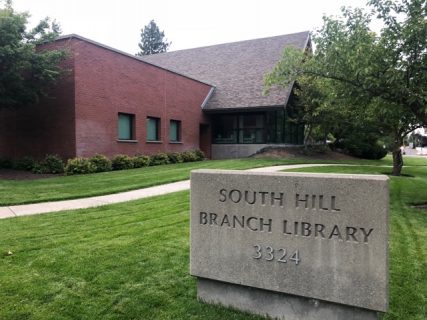On Tuesday evening, Humanities Washington and Spokane Public Library’s South Hill Branch hosted Matthew Sutton, as he sought to dispel false notions about the evangelical right with a talk titled “The Chosen Voters: Evangelicals in Modern America.”

“When other scholars who don’t really know what e
Sutton, the Edward R. Meyer Distinguished professor at Washington State University and author of “American Apocalypse: A History of Modern evangelicals,” has researched and studied evangelicals for years, and has received widespread media attention for his work. Sutton grew up in a conservative Christian household, and after studying biblical theory and history in college, he became fascinated with understand just what powers the evangelical voting machine.
Sutton described Trump’s ascendance as a result of “four decades of work” by evangelicals, of whom 81% voted for Trump, four decades that he traced back all the way to Evangelism’s predecessors, pre-millennialism and fundamentalism. Pre-Millennialists and fundamentalists shared the apocalyptic beliefs that many evangelicals still possess, beliefs that have shaped their voting for years.
Those values, combined with the threats of secularism, shifting family values, and the expansion of government, all stood as reasons Sutton pointed to as an explanation for why the group is so politically active.
“Because they believe Jesus is coming soon, this motivates them to act, to be even more involved, to be even more engaged,” he said. “They don’t withdraw, they don’t separate, they’re even more motivated to act and act now.”
Following his lecture, Sutton fielded questions from an audience of a variety of backgrounds. Some were openly critical of the religious right, while others expressed a more positive interest. He continued to dismiss notions by audience members that evangelicals are unintelligent or uneducated, rather focusing on the values and ideals they cling to in both their political and religious beliefs.
Sutton also spoke at length about Trump’s relationship with the evangelical right, something he felt was not as genuine as its proponents would claim. He admitted himself that he originally did not believe he would garner their support.
“Somebody behind the scenes knows how to appeal to evangelicals and win over this lobby,” he said. “These things are so obvious and so overt and so public, we don’t really need to look beyond the news to know what’s going on.”

Over 50 people attended, far surpassing any previous event Humanities Washington had hosted at the South Hill Branch. After the room was filled ten minutes before the event began, extra chairs had to be brought in to seat the crowd.
Librarian Becky Mace believed the increased interest was a result of the exposure evangelicals have received in recent political events and the controversy surrounding them.
“I think it’s a very relevant topic, something people are interested in,” she said. “This is a good chance to dialogue and understand each other, and it’s a very timely subject.”








